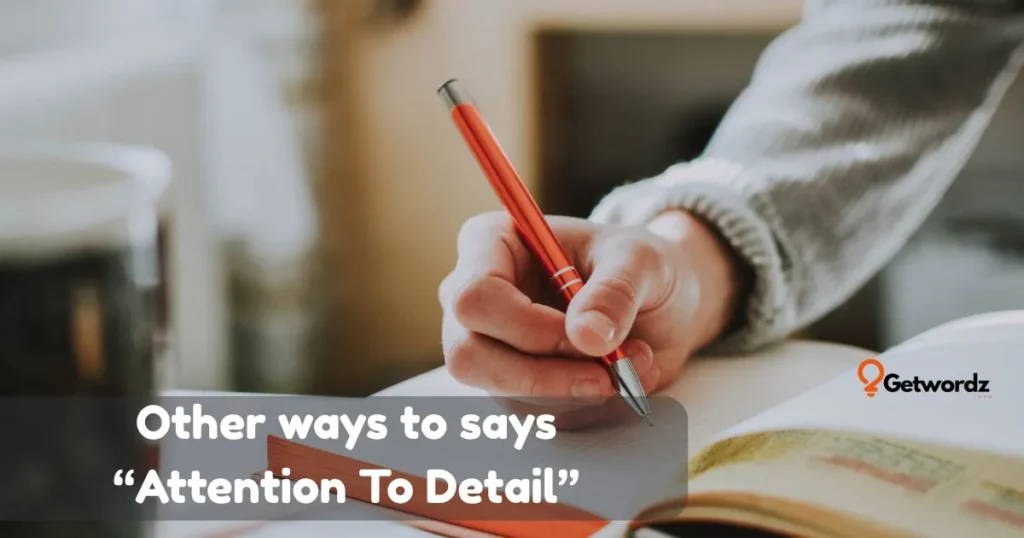Attention to detail is the ability to carefully monitor and manage both small and large elements of any task, ensuring accuracy, quality, and error-free results. It goes beyond simply checking work—it’s about being thorough, consistent, and organized while maintaining focus and efficiency. Whether you’re reviewing a report for work, planning a family event, or double-checking your own projects, honing this skill can boost reliability, productivity, and trust with colleagues, friends, and stakeholders.
In this guide, we’ll explore key habits, practical tips, and creative strategies to sharpen your attention to detail. You’ll learn how to slow down, minimize distractions, prioritize effectively, and review work from different perspectives—all while monitoring progress to maintain high standards without falling into perfectionism. Keep reading to discover actionable ways to improve focus, precision, and overall task performance.
What Does “Attention to Detail” Mean?
Attention to detail refers to the ability to carefully monitor and manage all aspects of a task, both big and small, to ensure accuracy, thoroughness, and error-free results. It’s about being organized, consistent, and focused, so that the work meets high standards without overlooking important elements. People use it to describe someone who notices the subtle things that make a big difference, whether in reports, projects, planning, or everyday tasks.
Is It Professional or Polite to Say “Attention to Detail”?
Yes, describing someone as having attention to detail is both professional and polite, especially in workplace or formal contexts. It highlights reliability, precision, and a commitment to quality without sounding critical. However, in casual conversation, it can sometimes feel formal or overused, so pairing it with examples or alternative expressions can make it sound more authentic and relatable.
1. Attention To Detail In Everyday Work Tasks
Scenario: You’re proofreading an important report at the office, and a tiny formatting error catches your eye before sending it to your manager.
Explanation: This phrase highlights meticulousness in professional settings. It’s formal and shows reliability, making it a creative alternative to simply saying “I’m careful.”
Examples:
- “Her attention to detail made the project report flawless.”
- “I always double-check my work to ensure attention to detail.”
- “Attention to detail is key when reviewing contracts.”
Why It Works: It signals precision and professionalism, instantly communicating that small mistakes won’t slip by.
2. Spotting Small Mistakes Quickly
Scenario: You notice a typo in a friend’s social media post before it goes live.
Explanation: This phrase emphasizes vigilance and quick observation. It’s casual and supportive, showing you care about quality.
Examples:
- “He’s great at spotting small mistakes quickly.”
- “Spotting small mistakes quickly saves us from bigger problems later.”
- “Her keen eye helps in spotting small mistakes quickly.”
Why It Works: It’s approachable yet practical, making it a relatable way to describe precision without sounding formal.
3. Eye For Detail
Scenario: You’re assembling a piece of furniture and notice a misaligned screw that others overlooked.
Explanation: “Eye for detail” is a widely recognized expression, casual yet professional. It’s a unique alternative to generic phrases like “I pay attention.”
Examples:
- “He has a natural eye for detail in design projects.”
- “An eye for detail is crucial in photography.”
- “Her eye for detail ensures no error goes unnoticed.”
Why It Works: It’s versatile, applicable in work, creative hobbies, or daily life, making it memorable and authentic.
4. Precision-Oriented Approach
Scenario: You’re finalizing a budget spreadsheet and notice a decimal point error that could have caused major discrepancies.
Explanation: This formal phrase conveys methodical care and reliability. It’s a strong, professional alternative to simply saying “careful.”
Examples:
- “A precision-oriented approach avoids costly mistakes.”
- “Our team values a precision-oriented approach for accurate results.”
- “She uses a precision-oriented approach to every project.”
Why It Works: It communicates expertise and trustworthiness, perfect for work or academic contexts.
5. Meticulous Observation
Scenario: While organizing an event, you notice minor scheduling conflicts and fix them before anyone else spots them.
Explanation: “Meticulous observation” signals careful attention and thoughtfulness. It’s formal, ideal for professional or personal praise.
Examples:
- “Meticulous observation helped us identify the problem early.”
- “His meticulous observation ensures nothing is overlooked.”
- “Meticulous observation is key in quality assurance.”
Why It Works: It emphasizes diligence and patience, creating a positive impression of thoroughness.
Read more: 30 Other Ways To Say “Best Wishes” With Examples!
6. Detail-Oriented Mindset
Scenario: You’re designing a presentation and adjusting color shades, font sizes, and spacing to perfection.
Explanation: This phrase highlights a thoughtful, organized approach. It’s professional and motivational, often used in resumes.
Examples:
- “A detail-oriented mindset is essential for project managers.”
- “Her detail-oriented mindset improves team efficiency.”
- “Cultivating a detail-oriented mindset helps avoid errors.”
Why It Works: It’s versatile, conveying both skill and intentionality, making it a strong alternative to generic praise.
7. Spotting Subtle Changes
Scenario: You notice a colleague has switched their hairstyle, or a subtle color change in a design template.
Explanation: This phrase is casual, showing attentiveness without being formal. It’s a friendly alternative to “paying attention.”
Examples:
- “He’s great at spotting subtle changes.”
- “Spotting subtle changes can prevent bigger issues.”
- “I admire her talent for spotting subtle changes in projects.”
Why It Works: Relatable in daily life and professional settings, highlighting observational skills creatively.
8. Observant Nature
Scenario: At a family gathering, you notice a sibling’s discomfort and adjust your conversation accordingly.
Explanation: “Observant nature” is warm and personal. It’s a supportive way to describe someone’s careful attention.
Examples:
- “Her observant nature makes her a great listener.”
- “An observant nature helps in noticing details others miss.”
- “His observant nature improves team collaboration.”
Why It Works: It’s friendly, approachable, and shows genuine care, making it versatile across situations.
9. Careful Scrutiny
Scenario: You review a contract line by line, ensuring nothing is ambiguous.
Explanation: Formal and professional, “careful scrutiny” emphasizes thorough examination. It’s a precise alternative to “checking carefully.”
Examples:
- “Careful scrutiny revealed hidden errors in the document.”
- “We applied careful scrutiny to the financial report.”
- “Her careful scrutiny prevented costly mistakes.”
Why It Works: It communicates thoroughness and authority, ideal for work or legal contexts.
10. Focused Attention
Scenario: You’re learning a new skill, like cooking or coding, and give full attention to every step.
Explanation: Casual yet professional, this phrase highlights concentration and diligence as a better way to express attentiveness.
Examples:
- “Focused attention is key when mastering a new skill.”
- “He approached the task with focused attention.”
- “Focused attention helps catch small errors quickly.”
Why It Works: Flexible in context, emphasizing both skill development and careful observation.
Read more: 30 Other Ways To Say “Customer Service Skills” With Examples!
11. Keen Eye For Accuracy
Scenario: While entering data, you double-check numbers to ensure they match source documents.
Explanation: Slightly formal, this phrase combines sharp observation with precision, making it a standout alternative to “being careful.”
Examples:
- “She has a keen eye for accuracy in data entry.”
- “A keen eye for accuracy ensures high-quality work.”
- “His keen eye for accuracy improves team performance.”
Why It Works: Shows intelligence and reliability while sounding professional and polished.
12. Mindful Observation
Scenario: You notice a friend’s mood change during a conversation and respond thoughtfully.
Explanation: Warm and personal, this phrase signals attentiveness without sounding rigid. It’s a creative alternative to simply saying “paying attention.”
Examples:
- “Mindful observation helps in understanding others better.”
- “She practices mindful observation during team meetings.”
- “Mindful observation enhances communication skills.”
Why It Works: Balances empathy and attentiveness, making it versatile for personal and professional contexts.
13. Thorough Review
Scenario: You review an article before publishing, checking grammar, flow, and formatting.
Explanation: Professional and straightforward, “thorough review” signals diligence and quality. It’s a better way to describe careful checking.
Examples:
- “A thorough review prevented publishing mistakes.”
- “He conducted a thorough review of the proposal.”
- “Thorough review ensures high-quality deliverables.”
Why It Works: It’s clear, authoritative, and communicates precision and reliability effectively.
14. Detail-Oriented Eye
Scenario: Decorating a room, you notice the smallest mismatched patterns in curtains and cushions.
Explanation: Friendly and descriptive, this phrase emphasizes a natural knack for noticing fine points.
Examples:
- “Her detail-oriented eye makes her designs flawless.”
- “A detail-oriented eye improves visual consistency.”
- “His detail-oriented eye catches errors others overlook.”
Why It Works: Creative and visual, it’s memorable while reinforcing observational skill.
15. Sharp Observation Skills
Scenario: You notice a typo on a sign in a public place and point it out before it’s printed widely.
Explanation: Casual yet professional, this phrase emphasizes quick recognition of errors.
Examples:
- “Sharp observation skills are essential in quality control.”
- “She uses her sharp observation skills in daily work.”
- “Sharp observation skills help identify potential issues early.”
Why It Works: It’s clear, dynamic, and conveys both intelligence and attentiveness.
Read more: 30 Other Ways To Say “First Come First Serve” With Examples!
16. Scrutinizing Every Detail
Scenario: Preparing a presentation, you examine every chart, graph, and statistic for accuracy.
Explanation: Slightly formal, this phrase conveys diligence and thoroughness. It’s a unique way to express deep focus.
Examples:
- “He’s great at scrutinizing every detail.”
- “Scrutinizing every detail ensures top-quality results.”
- “She spent hours scrutinizing every detail of the report.”
Why It Works: Emphasizes thoroughness and patience, suitable for professional or academic contexts.
17. Observing With Precision
Scenario: You notice subtle changes in market trends while analyzing data for a report.
Explanation: Professional and precise, this phrase conveys accuracy and attentiveness.
Examples:
- “Observing with precision helps in accurate forecasting.”
- “She approaches tasks by observing with precision.”
- “Observing with precision ensures minimal errors.”
Why It Works: Signals methodical skill, combining sharp observation with reliability.
18. Close Attention To Details
Scenario: You proofread a contract and catch inconsistencies that could lead to misunderstandings.
Explanation: Formal yet accessible, this phrase emphasizes meticulousness as a better wording alternative.
Examples:
- “Close attention to details prevents mistakes.”
- “He pays close attention to details in every project.”
- “Close attention to details ensures quality outcomes.”
Why It Works: Clear, professional, and versatile, making it widely applicable.
19. Careful Consideration
Scenario: You weigh pros and cons before making a major decision, noting small factors that others might miss.
Explanation: Warm and thoughtful, this phrase signals thoughtfulness rather than just observation.
Examples:
- “Careful consideration leads to better decisions.”
- “She approached the proposal with careful consideration.”
- “Careful consideration of each detail is essential.”
Why It Works: Conveys intelligence and reliability, suitable for both personal and professional use.
20. Methodical Attention
Scenario: Organizing files, you create a system that ensures nothing gets lost or overlooked.
Explanation: Professional and structured, this phrase emphasizes systematic observation.
Examples:
- “Methodical attention improves workflow efficiency.”
- “He approaches tasks with methodical attention.”
- “Methodical attention ensures nothing slips through the cracks.”
Why It Works: Highlights planning and consistency, appealing for professional contexts.
Read more: 30 Other Ways To Say “Happy Anniversary” With Examples!
21. Observant Eye For Details
Scenario: You notice a colleague’s new hairstyle and compliment them naturally.
Explanation: Friendly and descriptive, this phrase emphasizes noticing subtle, meaningful details.
Examples:
- “Her observant eye for details is impressive.”
- “An observant eye for details strengthens teamwork.”
- “He uses his observant eye for details in design projects.”
Why It Works: Relatable, warm, and versatile, bridging personal and professional life.
22. Attentive To Nuances
Scenario: While negotiating a contract, you pick up on subtle shifts in tone or phrasing.
Explanation: Slightly formal, this phrase conveys deep perceptiveness, making it a strong alternative to generic “pay attention.”
Examples:
- “Attentive to nuances, she noticed the overlooked clause.”
- “He is always attentive to nuances in client communication.”
- “Attentive to nuances, she resolves misunderstandings quickly.”
Why It Works: Signals sophistication and awareness, appealing for professional contexts.
23. Meticulous Attention
Scenario: Designing a brochure, you adjust every font, spacing, and alignment for perfect symmetry.
Explanation: Formal and professional, it emphasizes exactness and precision.
Examples:
- “Meticulous attention guarantees high-quality design.”
- “He works with meticulous attention on every project.”
- “Meticulous attention prevents errors and ensures consistency.”
Why It Works: Signals diligence, care, and reliability, ideal for professional use.
24. Focused Observation
Scenario: You watch a training video carefully to catch every instruction and detail.
Explanation: Casual yet professional, this phrase emphasizes concentration and awareness.
Examples:
- “Focused observation helps in learning new skills quickly.”
- “She applies focused observation during team workshops.”
- “Focused observation ensures accurate execution of tasks.”
Why It Works: Clear, actionable, and relatable for both work and learning contexts.
25. Exceptional Detail Recognition
Scenario: You spot subtle inconsistencies in a project that others might miss.
Explanation: Slightly formal, it highlights a rare and valued skill.
Examples:
- “His exceptional detail recognition improves project outcomes.”
- “She has exceptional detail recognition in editing work.”
- “Exceptional detail recognition sets top performers apart.”
Why It Works: Signals rare skill, reliability, and attentiveness, making it memorable.
Read more: 30 Other Ways To Say “God Bless You” With Examples!
26. Thorough Examination
Scenario: Reviewing a research paper line by line for accuracy and clarity.
Explanation: Formal and authoritative, this phrase conveys careful inspection.
Examples:
- “Thorough examination revealed critical mistakes.”
- “She conducted a thorough examination of the data.”
- “Thorough examination ensures accuracy and quality.”
Why It Works: Professional and precise, perfect for academic, legal, or business contexts.
27. Keen Observational Skill
Scenario: You notice body language cues that hint someone is uncomfortable in a conversation.
Explanation: Friendly yet professional, this phrase conveys sharp attention and empathy.
Examples:
- “Keen observational skill improves communication.”
- “She uses keen observational skill to assess situations.”
- “Keen observational skill helps detect subtle issues early.”
Why It Works: Balances awareness with empathy, versatile for multiple contexts.
28. High-Level Attention To Details
Scenario: Preparing a critical client presentation, you ensure charts, graphs, and facts are flawless.
Explanation: Formal and impressive, this phrase conveys expertise and professionalism.
Examples:
- “High-level attention to details ensures client satisfaction.”
- “He demonstrates high-level attention to details in his work.”
- “High-level attention to details sets her apart in project management.”
Why It Works: Shows expertise and credibility, ideal for professional achievements.
29. Sharp Focus On Accuracy
Scenario: Checking calculations in a financial report before submission.
Explanation: Professional and precise, emphasizing accuracy as the ultimate goal.
Examples:
- “Sharp focus on accuracy prevents costly mistakes.”
- “She maintains a sharp focus on accuracy in all tasks.”
- “Sharp focus on accuracy is key to reliable results.”
Why It Works: Signals precision and trustworthiness, making it a strong professional alternative.
30. Careful Observation Skills
Scenario: Watching a teammate’s process to learn and improve your own technique.
Explanation: Casual and versatile, highlighting attentive and thoughtful behavior.
Examples:
- “Careful observation skills help in skill-building.”
- “He uses careful observation skills to improve team efficiency.”
- “Careful observation skills ensure no detail is missed.”
Why It Works: Friendly, actionable, and broadly applicable, perfect for personal growth and professional development.
Pros and cons of using “Attention To Detail”
pros
- Improves Accuracy: Ensures tasks, reports, and projects are completed without errors.
- Enhances Productivity: Helps identify mistakes early, saving time and reducing rework.
- Builds Trust and Reliability: Colleagues and clients value people who consistently notice important details.
- Boosts Creativity: Small observations can inspire innovative solutions and unique ideas.
- Strengthens Professional Reputation: Attention to detail signals professionalism and competence in any field.
Cons
- Time-Consuming: Focusing too much on minor details can slow down overall progress.
- Perfectionism Risk: Can lead to overthinking or unnecessary stress when things aren’t perfect.
- May Cause Overload: Constant attention to details can be mentally exhausting.
- Possible Micromanagement: In team settings, being too detail-oriented may frustrate colleagues.
- Difficulty Prioritizing: Over-focusing on small details can make it hard to see the bigger picture.
FAQS
What is another way to say attention to detail?
You can describe attention to detail using phrases like meticulousness, precision, carefulness, or being thorough. These alternatives convey the same idea of noticing small elements and ensuring tasks are completed accurately.
How do you say attention to detail professionally?
In professional contexts, terms like detail-oriented, methodical, observant, or quality-focused work well. They highlight reliability, accuracy, and a commitment to high standards without sounding casual or overused.
How do you say “detail-oriented”?
“Detail-oriented” can be expressed in other professional ways, such as meticulous, precision-focused, careful, or systematic. These words emphasize consistent accuracy and the ability to spot errors before they become problems.
What is an alternative to attention to detail?
Alternative expressions include thoroughness, high accuracy, keen observation, or careful monitoring. Depending on context, you can also use quality-conscious, diligent, or methodical approach to communicate the same skill.
How can you describe meticulousness in work?
Meticulousness can be described as careful planning, precise execution, close monitoring of tasks, or scrupulous attention. These phrases show that you focus on both the small and large aspects of any project.
What are creative ways to express precision skills?
Creative ways to convey precision include phrases like eagle-eyed, finely tuned focus, exacting standards, or spot-on execution. These give a more vivid, memorable description than the standard “attention to detail.”
How do you show thoroughness without saying attention to detail?
You can express thoroughness with words like comprehensive approach, methodical review, complete assessment, or careful evaluation. These phrases communicate diligence without using the cliché.
What are unique phrases for being careful and accurate?
Unique options include error-conscious, exactness in work, precision-minded, or detail-savvy. These alternatives are professional yet stand out from standard expressions.
Closing words
Attention To Detail is more than just noticing small things, it’s a skill that elevates your work, interactions, and everyday life. By exploring fresh alternatives and creative expressions, you can move beyond overused phrases and communicate with clarity and authenticity.
These unique expressions and better wording options make it easier to convey thoughtfulness and precision in various situations.
Whether you’re sending a message to friends, writing professional notes, or posting on social media, these different ways to say attention to detail help you stand out and express care effectively.
Try using one of these phrases in your next interaction and notice the positive impact.
Using these creative alternatives enhances communication, making your messages more genuine, engaging, and memorable. Incorporating attention to detail into your language not only strengthens understanding but also shows sincerity and intentionality in every context.




